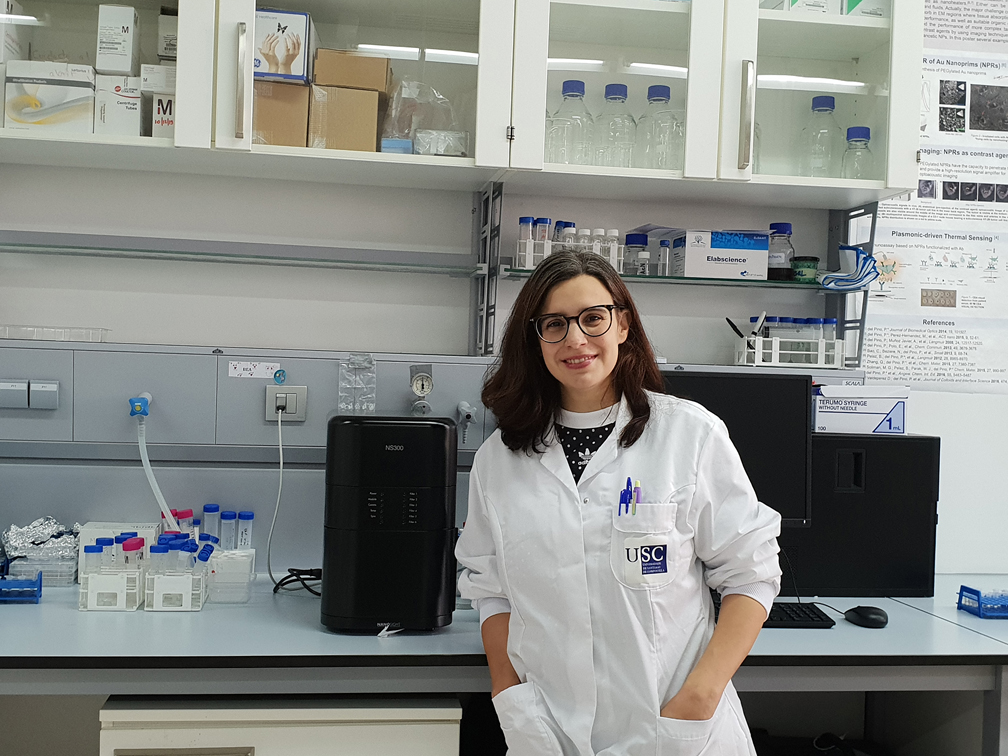- The project Spacing will explore DNA-based technology to develop new nanomedicines and will be funded with 1,5 M€
- Sixth CiQUS’ researcher granted by the European Research Council (ERC), one of the most internationally prestigious scientific funding programmes
Dr. Beatriz Pelaz, CiQUS (USC) researcher, has been awarded an European Research Council (ERC) Starting grant to develop the project “Spacing”. This European programme aims to foster scientific excellence by funding research projects at the frontier of knowledge, recognising and promoting the professional careers of young scientists (between 2 and 7 years after obtaining their PhDs). The call is highly competitive, with great international prestige, and one of the main indicators of scientific excellence.
The project “Spacing” aims to develop a new DNA-based technology that can modify the surface area of nanomaterials, in particular nanoparticles, with a 1.5 million euro budget and 5-year scope. The main goal is “to produce nanometric printers to print certain molecular patterns (ligands) on the surface of nanoparticles, inspired by, for example, the protein shells of some viruses, critical in determining their infectivity”, as explains the researcher Beatriz Pelaz. The multifunctionality, robustness and precision of this innovative technology aims to lay the foundations for the development of the most efficient nanomedicines and to better understand “how the interactions between the nanoparticle ligands and cells work”, she adds.
Success in talent attraction strategy
Beatriz Pelaz holds a degree in chemistry from the Universidad de Valladolid (2005) and in biochemistry from the Universidad de Zaragoza (2011). In March 2012, she received her PhD degree with European mention from the Universidad de Zaragoza. From June 2012 to December 2016, Beatriz was a member of the group led by Professor Wolfgang J. Parak at the Philipps-Universität Marburg, in Germany. First, as postdoctoral research fellow and then as Alexander von Humboldt researcher. From January 2017, she has co-led the BionanoTools Group in CiQUS at the USC, first as principal investigator of a project for young researchers (JIN, MINECO), and from 2019 onwards as a Ramón y Cajal researcher. Her research focuses on developing intelligent materials that can be controlled remotely and studying their interaction with biological entities.
The ERC grant awarded to Beatriz Pelaz not only strengthens the position of the CiQUS and the USC as excellent research centres in Europe, but also as an international reference institution for talent attraction through the recruitment of young scientists who had no previous relationship with Galicia, such in the case of Beatriz Pelaz.
About the ERC
The European Research Council (ERC), created by the European Union in 2007, annually selects and funds a group of researchers of any nationality and age to carry out highly innovative, far-reaching projects. The selection process is very competitive, with a success rate below 10%. There are three calls for the different stages of the scientific career (Advanced, Consolidator and Starting Grants), and specific calls for technology transfer (proof of concept).
Previously, up to five CiQUS’ researchers, through eight different research projects, have been awarded prestigious ERC Grants by the European Research Council for a total amount of 9.5 million euros (1 Advanced Grant, 1 Consolidator Grant, 3 Starting Grants and 3 Proof of Concept Grants).



